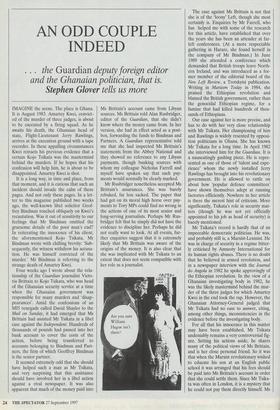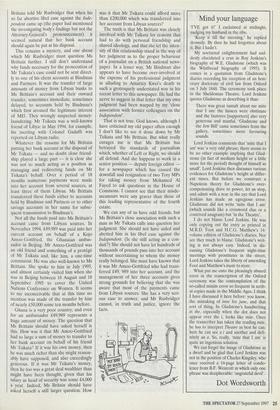AN ODD COUPLE INDEED
. . . the Guardian deputy foreign editor
and the Ghanaian politician, that is.
IMAGINE the scene. The place is Ghana. It is August 1983. Amartey Kwei, convict- ed of the murder of three judges, is about to be executed by a firing squad. As he awaits his death, the Ghanaian head of state, Flight-Lieutenant Jerry Rawlings, arrives at the execution ground with a tape recorder. In these appalling circumstances Kwei retracts his previous evidence that a certain Kojo Tsikata was the mastermind behind the murders. If he hopes that his confession will help him, he is about to be disappointed. Amartey Kwei is shot.
It is a long way, in time and place, from that moment, and it is curious that such an incident should invade the calm of these pages. And not only these pages. In a let- ter to this magazine published two weeks ago, the well-known libel solicitor Geof- frey Bindman touched obliquely on Kwei's recantation. Was it out of sensitivity to our feelings that Mr Bindman omitted the gruesome details of the poor man's end? In reiterating the innocence of his client, the aforementioned Kojo Tsikata, Mr Bindman wrote with chilling brevity: 'Sub- sequently, the witness withdrew his accusa- tion. He was himself convicted of the murder.' Mr Bindman is referring to the strange death of Amartey Kwei.
Four weeks ago I wrote about the rela- tionship of the Guardian journalist Victo- ria Brittain to Kojo Tsikata, who was head of the Ghanaian security service at a time when the Ghanaian government was responsible for many murders and 'disap- pearances'. Amid the confessions of an MI5 renegade called David Shayler to the Mail on Sunday, it had emerged that Ms Brittain had assisted Mr Tsikata in a libel case against the Independent. Hundreds of thousands of pounds had passed into her bank account to cover the costs of the action, before being transferred to accounts belonging to Bindman and Part- ners, the firm of which Geoffrey Bindman is the senior partner.
It seemed extremely odd that she should have helped such a man as Mr Tsikata, and very surprising that this assistance should have involved her in a libel action against a rival newspaper. It was also apparent that much of the money paid into Ms Brittain's account came from Libyan sources. Ms Brittain told Alan Rusbridger, editor of the Guardian, that she didn't know where the money came from. In her version, she had in effect acted as a post- box, forwarding the funds to Bindman and Partners. A Guardian representative told me that she had inspected Ms Brittain's statements from the Abbey National and they showed no reference to any Libyan payments, though banking sources with whom my colleague Nicholas Farrell and myself have spoken say that such pay- ments would normally be clearly marked.
Mr Rusbridger nonetheless accepted Ms Brittain's assurances. She was barely rebuked, far less sacked. The paper that had got on its moral high horse over pay- ments to Tory MPs could find no wrong in the actions of one of its most senior and long-serving journalists. Perhaps Mr Rus- bridger felt that he simply did not have the evidence to discipline her. Perhaps he did not really want to look. At all events, fur- ther enquiries suggest that it is extremely likely that Ms Brittain was aware of the origins of the money. It is also clear that she was implicated with Mr Tsikata to an extent that does not seem compatible with her role as a journalist. The case against Ms Brittain is not that she is of the 'loony' Left, though she most certainly is. Enquiries by Mr Farrell, who has helped me with some of the research for this article, have established that over the years she has been an attender at far- left conferences. (At a more respectable gathering in Harare, she found herself in the company of Mr Bindman.) In June 1989 she attended a conference which demanded that British troops leave North- ern Ireland, and was introduced as a for- mer member of the editorial board of the New Left Review, a Trotskyist publication. Writing in Marxism Today in 1984, she praised the Ethiopian revolution and blamed the British government, rather than the genocidal Ethiopian regime, for a famine that had killed hundreds of thou- sands of Ethiopians.
Our case against her is more precise, and has to do with her very close relationship with Mr Tsikata. Her championing of him and Rawlings is widely resented by opposi- tion politicians in Ghana. She has known Mr Tsikata for a long time. In April 1982 she interviewed him for the Guardian. It is a nauseatingly gushing piece. He is repre- sented as one of those of 'talent and expe- rience' whom the newly installed Jerry Rawlings has brought into his revolutionary government. He is allowed to rattle on about how 'popular defence committees' have shown themselves adept at running factories efficiently. Nowhere in her article is there the merest hint of criticism. More significantly, Tsikata's role in security mat- ters (though he was not yet officially appointed to his job as head of security) is barely mentioned.
Mr Tsikata's record is hardly that of an impeccable democratic politician. He was, and probably still is, a Marxist-Leninist. He was in charge of security in a regime bitter- ly criticised by Amnesty International for its human rights abuses. There is no doubt that he believed in armed revolution, and in a newspaper interview with the Journal do Angola in 1982 he spoke approvingly of the Ethiopian revolution. In the view of a Ghanaian investigating body in 1982, he was the likely mastermind behind the mur- der of the three judges for which Amartey Kwei in the end took the rap. However, the Ghanaian Attorney-General judged that Mr Tsikata had no case to answer, citing, among other things, inconsistencies in the evidence before the investigating body.
For all that his innocence in this matter may have been established, Mr Tsikata undeniably remains a very controversial fig- ure. Setting his actions aside, he shares many of the political views of Ms Brittain, and is her close personal friend. So it was that when the Marxist revolutionary wished to educate his son at an English public school it was arranged that his fees should be paid into Ms Brittain's account in order that she could settle them. Since Mr Tsika- ta was often in London, it is a mystery that he could not pay them directly himself. Ms Brittain told Mr Rusbridger that when his so far abortive libel case against the Inde- pendent came up (the paper had mentioned the investigating body's findings but not the Attorney-General's pronouncement) it seemed natural that her bank account should again be put at his disposal.
This remains a mystery, and one about which Mr Rusbridger must question Ms Brittain further. I still don't understand why funds necessary for the prosecution of Mr Tsikata's case could not be sent direct- ly to one of his client accounts at Bindman and Partners. It was the transfer of large amounts of money from Libyan banks to Ms Brittain's account and their onward transfer, sometimes immediate, sometimes delayed, to accounts held by Bindman's which first aroused the legitimate interest of MI5. They wrongly suspected money- laundering. Mr Tsikata was a well-known friend of Libya: in May 1994, for example, his meeting with Colonel Gadaffi was reported on Libyan radio.
Whatever the reasons for Ms Brittain putting her bank account at the disposal of Mr Tsikata — and no doubt close friend- ship played a large part — it is clear she was not so much acting as a postbox as managing and redirecting funds on Mr Tsikata's behalf. Over a period of 18 months numerous payments were made into her account from several sources, at least three of them Libyan. Ms Brittain transferred these funds either to accounts held by Bindman and Partners or to other savings accounts in her name for subse- quent transmission to Bindman's.
Not all the funds paid into Ms Brittain's account came from Libyan sources. In November 1994, £49,989 was paid into her current account on behalf of a Kojo Amoo-Gottfried, the Ghanaian ambas- sador in Beijing. Mr Amoo-Gottfried was an old friend and something of a prot6ge of Mr Tsikata and, like him, a one-time communist. He was also well-known to Ms Brittain. She spoke to him in July 1995, and almost certainly visited him when she was in Beijing between 18 August and 18 September 1995 to cover the United Nations Conference on Women. It seems to me inconceivable that at this time no mention was made of the transfer by him of nearly £50,000 some ten months before.
Ghana is a very poor country, and even for an ambassador £49,989 represents a huge amount of money. The question that Ms Brittain should have asked herself is this. How was it that Mr Amoo-Gottfried had so large a sum of money to transfer to her bank account on behalf of his friend Mr Tsikata? If it was his own money, then he was much richer than she might reason- ably have supposed, and also exceedingly generous. If it was Mr Tsikata's money, then he too was a great deal wealthier than might have been thought, given that his salary as head of security was some £4,000 a year. Indeed, Ms Britain should have asked herself a still larger question. How was it that Mr Tsikata could afford more than £200,000 which was transferred into her account from Libyan sources?
The truth is that Ms Brittain was closely involved with Mr Tsikata for reasons that had to do with personal friendship and shared ideology, and that she let the inten- sity of this relationship stand in the way of her judgment as to the proper behaviour of a journalist on a British national news- paper. In a lesser way, Mr Bindman also appears to have become over-involved at the expense of his professional judgment in alluding to Amartey Kwei's death in such a grotesquely understated way in his recent letter to this newspaper. He had the nerve to suggest in that letter that my own judgment had been warped by my 'close association with former colleagues on the Independent'.
That is not true. God knows, although I have criticised my old paper often enough I don't like to see it done down by Mr Tsikata and Ms Brittain. But what really enrages me is that Ms Brittain has betrayed the standards of journalism which, whether of Left or Right, we should all defend. And she happens to work in a senior position — deputy foreign editor for a newspaper which has caused the downfall and resignation of two Tory MPs for taking money from Mohamed Al Fayed to ask questions in the House of Commons. I cannot see that their misde- meanours were any graver than those of this leading representative of the fourth estate.
We can any of us have odd friends, but Ms Brittain's close association with such a man as Mr Tsikata calls into question her judgment. She should not have aided and abetted him in his libel case against the Independent. (Is she still acting as a con- duit?) She should not have let hundreds of thousands of pounds pass into her account without ascertaining to whom the money really belonged. She must have known that it was Mr Amoo-Gottfried who had trans- ferred £49, 989 into her account, and the management of her three accounts gives strong grounds for believing that she was aware that most of the payments came from Libyan sources. She has a very seri- ous case to answer, and Mr Rusbridger cannot, in truth and justice, ignore the facts.











































































 Previous page
Previous page